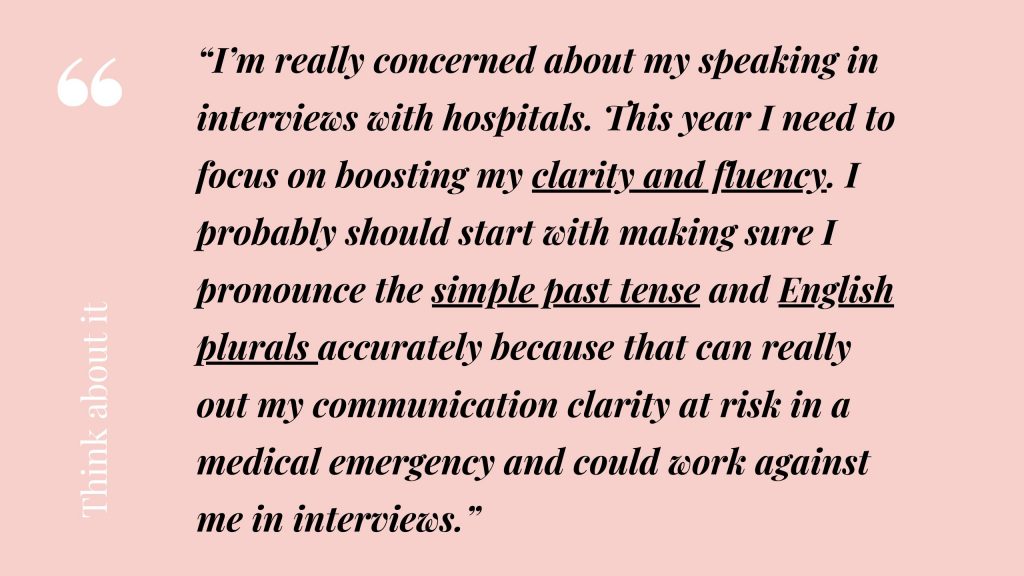TRANSCRIPT
Maybe you’re wanting to move your English pronunciation as close to a native speaker or perhaps you’re looking for some motivation to practice pronunciation goals that you’ve already worked on with our team. Whatever it is, this vlog is going to give you a solid foundation in the 10 Principles of Neuroplasticity and why they matter so much for your English pronunciation goals.
But before we begin let me introduce myself. I’m Sarah, chief speech pathologist at Voice science and on this channel we share tips to give your communication more strategy and success so if you like the sound of that, you might like to subscribe.
Real English speaking progress is about harnessing the power of neuroplasticity.
Neuroplasticity is the “mechanism by which your brain encodes experience and learns new behaviours (Kleim & Jones, 2008)”
Sounds a bit like second language acquisition, doesn’t it?
Don’t you think that learning a new language is also a “mechanism by which your brain encodes experience and learns new behaviours?” Totally!!
And, if you know the principles that set up neuroplasticity, you can drive your speaking goals to the max and short circuit success much quicker.
There are 10 Principles that Drive neuroplasticity
I want you to take these into account so grab yourself a pen and some paper and jot each one down. They’ll serve as a good reminder as you push your speaking goals forward.
Principle One: Use it or Lose it
I don’t think that one needs any explanation! Your brain thrives on loyal learning. If you really want to improve your English speaking, you have to use English when speaking!
At the moment in lockdown, it may be really hard for you to keep up your conversations and pronunciation practice. Our team is here to support you with this goal and we’ve welcomed on board a lot of clients with good English proficiency but who feel like their speaking is slipping because of less opportunity to speak. This has been a great period of detailed pronunciation practice for many of our clients, now is a perfect time to focus on some of your core skillsets for your English so why not take the opportunity to clarify your pronunciation further, or tune-up your grammar skills or work specifically on expanding your vocabulary daily. If your stuck, we can show you how to add more heavy lifting to your English communication.
Principle Two: Use it and Improve it
Speaking skills can have a tendency to not just deteriorate but also plateau when it comes to our second language.
This second principle of neuroplasticity is all about zooming in on new levels of detail so that you can level up specific skills.
You can apply this type of learning more effectively by being very specific about your English pronunciation goals.
If you’re wanting to enhance your speaking or clarify your accent you must know exactly what sounds you need to work on.
Don’t get lost or distracted by being too general.
You must practice a specific skill.
Don’t take short cuts.
If you prefer to email rather than call because you’re worried about your English speaking, show up. Get on the phone. Use your voice.
If you feel worried about your speaking in web calls, show up with your own phone’s camera and practice speaking into the lens.
You’ve got to use it to improve it.
Hiding sets you back.
Show up!
Which leads me to the 3rd principle,
Principle Three: Specificity
Let’s tune in to 2 Speakers- Maria & Benny!
Compare them and tell me who do you think will be the most successful learner…
Maria is freaking out about her English speaking. She feels so stressed to speak up at work.
Or how about Benny.
Benny is also worried out about his speaking level. He feels worried about the coming job interviews he needs to do to get a role as a pediatric registrar.
Having a clear focus around your speaking goals is really important and if you want to learn more about how to write powerful goals, make sure you check out this blog post which I’ve linked for you in the comments below. You can even pick up yourself a smart goal planner made by our team.
Principle Four: Repetition Matters
To get those speaking goals happening you have to do it again, and again and again.
Speaking and pronunciation goals thrive with loyal practice.
You’re counting on sufficient repetition to harness and consolidate new skills and pronunciation practice has to happen. You have to repeat targets to make the learning long-lasting.
I want to encourage you to focus on continually performing your speaking skills through practice because the longer you repeat it, the more resistant to decay that skill will be.
How does this look for you?
Think about practising the same speaking goals that we’ve given you at Voice Science, every day and try to get a running streak of 15 – 30 days even for the same target.
For example, if you want to fix your past simple pronunciation, don’t stop at day 3 once you understand the rules.
Repeat your practice long term, because learning is not about understanding, it’s about integrating the new behaviour for the long term by harnessing the power of neuroplasticity.
Principle Five: Intensity Matters
Are you the kind of person who reads 5 words with the correct sound from our word drills in Cadenza and then gives up? Well, stop right there because I need to tell you off. Just kidding.
High-intensity matters.
Your chances of firing new neural networks for your speaking clarity are higher if you drill heavily.
That doesn’t mean read the same word 500 times, but it does mean possibly finding 100 different ways to practice a sound target – which you can do so easily with this resource, the High Voltage Speaking drill from Cadenza, make sure you check that video out once you’ve finished this one.
Our team will share with you so many ways to practice intensely and this is one straight from our team that we’ve made available for free download so make sure you pick it up over on our website today!
Principle Six: Time Matters
When you learn new pronunciation goals, you’re learning a process not one singular thing.
It is good to address pronunciation correction as soon as possible so that incorrect behaviours have less time to solidify.
It’s hard to break a bad habit right? So nip it in the bud and start!
If you’ve been wondering about when you should start clarifying your pronunciation, don’t board the late train!
I meet a lot of clients who were waiting around for lots of reasons like I want to fix my grammar first or I need to focus on more vocabulary or my writing skills first.
I’d argue, you need all those things so start before your ready or you might find you’ve sold yourself short and have a whole set of bad habits to undo.
Principle Seven: Salience Matters
Don’t worry about the word salient, it just means that what is important to you matters!
If you want to learn something new, you’ll only learn it, if it feels like a relevant skill.
If you’re wondering whether you really want to improve your English speaking you have to ask yourself about your motivations. If you really get to the main reason why you want to level up, you’ll find that detailed learning will work well for you because you believe that speaking goals are important. This is why in Your Personalised Pronunciation Audit I’m more interested in why you want to improve your speaking before I audit your actual speaking level because once I know what your goals are and what is motivating you to improve I can then ensure that we address your needs with relevance so that the learning sticks harder. People don’t learn things that don’t seem relevant to them.
How can you apply this principle to your speaking practice today?
I always tell my clients, you must practice the words you use. Ignore the words that you’d never say. A good way to apply this practice could be working on correcting your plural pronunciation rules by creating your own list of nouns that you use at work and using that as your practice material.
Principle Eight: Age Matters
Yes, younger brains tend to thrive with new learning more than the elderly.
But don’t feel insulted if your digits are pushing upwards!
One study suggests that while processing speed slows down as you age it’s possible to
“revitalise older brains through mental training or workouts to produce functioning characteristics that closely resemble or even exceed those of younger brains.”
AND, some types of brain processing improve with age, like integrated functioning and flexible problems solving, skills that you really need for communication goals. So it’s never too late (Keely, 2016)!
Principle Nine: Transference
One of the most challenging factors in communication is taking the new skill that you learnt and getting it out in real life. When you’re practising your pronunciation goals it’s important to have a specific game plan to integrate and transfer the speaking to real-life situations.
Principle Ten: Interference
The last principle of neuroplasticity is a word of warning to anyone who gets distracted by multiple communication goals.
When we first started Voice science we used to address pronunciation clarity goals alongside social communication goals and try to do everything all at once.
But then it didn’t take long to see that clients who worked on voice therapy strategies, as well as pronunciation intensively, weren’t getting the same gains as clients who really focused on one core service for their sessions.
This is why our programs are splintered into
High-Performance Communication sessions as it lets us sit up straight and follow the research.
Addressing your learning at the micro level for pronunciation always pays off. Your brain can work more efficiently and goals will get more traction. So if you’re wanting to work on your pronunciation as well as your voice tone, we recommend starting with pronunciation first and not getting distracted by shiny object syndrome. One step at a time. Once your heavy lifting is done for pronunciation, you can definitely start work on other areas but don’t lose your focus or you may find the distraction will interfere with your first goals.
And there you were thinking your speaking was going to improve by copying native speakers on Youtube.
It’s much deeper than that, isn’t it, which is why I really wanted to make this vlog for you.
It has been on my list for a long time because I’d hate the thought that you might feel demoralised that your best efforts to improve your English speaking never really worked out for you.
There is a science to pronunciation clarification and that’s why its always best working 1-1 with a speech pathologist so that a science-based method is used because your time is precious given that there are no short cuts to speaking success, it pays to learn with these principles of neuroplasticity top of min.
And at Voice Science, we’ll always remind you of them!
Well, there we have it! 10 Powerful Principles. They give me a lot of clarity daily when I make strategies for my clients so that my work follows the science of learning and I’m sure you can use them too.
I hope you enjoyed this vlog and that it gave you clarity and insight into what really matters if you want to improve your English speaking. It’s a process. There’s enough research to strive to do it the right way and we’re here to lead you by the hand, so make sure you subscribe and follow us on our socials if you haven’t already! After watching this vlog, I think it’s good for you to evaluate what’s next for your English speaking. Which principle do you really need to add to your life and how are you going to do it? Let me know in the comments below.
Thank you so much for watching, don’t forget to give this one a thumbs up if you enjoyed it and I’ll see you next time.
Ciao!
Your Personalised Pronunciation Audit from Cadenza™
Find Out Exactly How to Progress Your English Speaking Strategically
There’s no second guessing if you have a Personalised Pronunciation Audit because we will diagnose and prescribe exactly what your English speaking needs at the moment to move forward.
Your Personalised Pronunciation Audit leads you by the hand.
We will identify which one of the 5 Bottlenecks to Pronunciation Clarity you need to overcome now.
It’s simple, clear and clean. It’s fun & engaging.
You can do it right here & right now.














